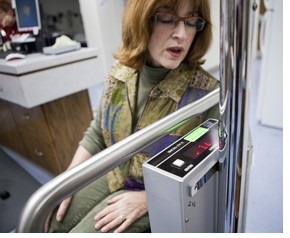What's Your Weight? Accessible Scales Support Health for Wheelchair Users
 What’s the first thing you do after checking in for an appointment with your doctor?
What’s the first thing you do after checking in for an appointment with your doctor?
For most people, it’s stepping onto the oft-dreaded scale. Our weight tells part of the story of our health, and it’s a critical piece of information for determining the dosage of some medicines.
But if you’re a person who uses a wheelchair and/or has difficulty standing, chances are you won’t be weighed at a medical visit. Many primary care providers and clinics simply don’t have wheelchair accessible scales, so wheelchair users have to guess their own weight. And guessing is not likely to be accurate when one may not have been weighed in many months or years.
University of Kansas researcher Dot Nary, PhD, conducted a study to learn where accessible scales are available in medical settings in Lawrence, hometown to the university.
“Accessible weight scales are expensive and too large to store in the typical home,” explained Nary, who uses a wheelchair. “Therefore, access to a weight scale in the community is important to this population, as data show people with disabilities have higher rates of overweight and obesity.”
The unfunded study was small, but the results echo findings of other research related to health care for people with disabilities: Lawrence residents who use wheelchairs or are unable to stand on a typical weight scale are likely to experience difficulty monitoring their weight.
With the help of KU undergraduates Becky Cannon and Jordyn Gunville, Nary surveyed the one hospital in Lawrence, seven clinics, nine primary care providers (excluding pediatric offices), and two weight management programs. The survey included questions about the availability of accessible scales, protocols and staff training for using them, and who might be eligible to use the scales.
The good news is that the hospital, three clinics and both weight loss programs have accessible scales. However, five primary care provider offices and one clinic reported that they have no accessible scale, while the rest of the providers and clinics did not respond to phone or mail surveys.
Although the goal of the survey was only to identify weight measurement opportunities for wheelchair users, Nary speculates that some offices did not respond because they were concerned about being non-compliant with requirements of the Americans with Disabilities Act. The ADA sets standards for equal opportunities in health care for people with disabilities.
“Several primary care providers cited expense as the reason they did not provide an accessible scale for their patients who required one,” said Nary. “Other providers indicated that they refer patients elsewhere to be weighed, including to the local hospital, but it’s not clear whether patients follow through.” In addition, the accessible scales that were identified are not generally available to the public, so presently, there is no place where a wheelchair user can easily and regularly be weighed.
Tax incentives are available to health care providers to purchase accessible equipment, including scales and adjustable height exam tables.
“Given our aging society and the fact that our city is being promoted as a retirement destination, the provision of accessible health care services is likely to be even more in demand in the future,” said Nary.
“Nationally, there has been much attention in recent years to health and wellness services for people with disabilities, who can live long and healthy lives. We need to be sure that all community members, including people with disabilities, have full access to the services they need to be healthy.”